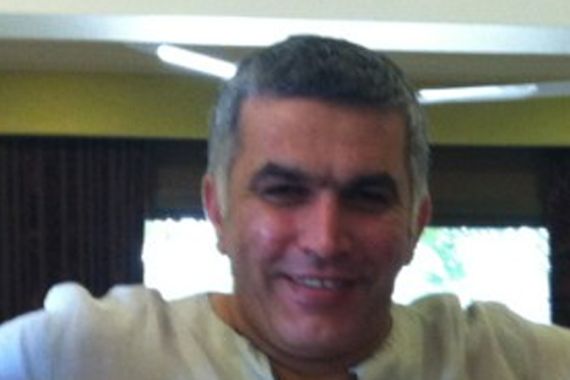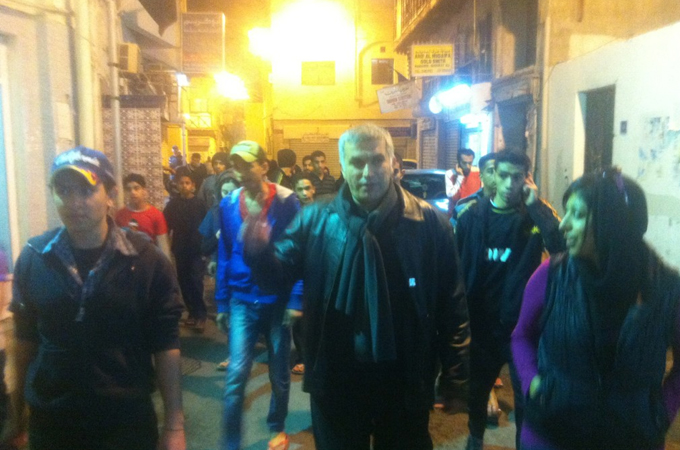Bahraini activist beaten by ‘riot police’
Nabeel Rajab, a rights activist, is beaten in Bahrain, although authorities deny any responsibility for the attack.

 |
| Rajab, participating in a march on Friday night, shortly before he said was beaten by riot police in Manama [Twitter] |
Nabeel Rajab, the head of the Bahrain Centre for Human Rights, has been beaten and briefly detained after a march he took part in in the capital Manama was dispersed.
Speaking to Al Jazeera from his home soon after leaving the Sulaimaniya hospital, Rajab said that he was attacked after riot police charged the crowd he and other protesters hid in nearby homes. They waited for things to calm down before leaving to return to their own homes.
“Maybe 25, 30 minutes later, I went out toward my car and they found me and attacked me,” said Rajab.
Multiple posts on the microblogging site featured a video of Nabeel Rajab speaking to riot police on Friday night, shortly before he was beaten and taken away.
His colleague at the rights centre, S Yousif Almuhfada, posted that Rajab had been released after being questioned by the authorities. For several hours, social media was flooded with concern and rumours about Rajab’s fate.
|
|
“Five, six, seven people, I don’t know how many people. They were attacking from everywhere. When a police officer came, I heard them say, ‘We found Nabeel lying down,’ and I said, ‘No, I’m not lying down – you’re beating me,'” Rajab said.
When they started beating him, Rajab said he identified himself and said he was a rights activist.
“They said, ‘Are you Nabeel Rajab?’ I said ‘Yes’, then they beat me more,” pointing out that the men who beat him were Jordanians, Syrians and Pakistanis, dressed as riot police and special forces.
“But the officer was Bahraini. When he saw them beating me, they stopped, because he knew it was too much and they called an ambulance.”
At the hospital, Rajab said he was questioned about who had assaulted him, but he brushed off the attempt to find the culprits.
“I told them, ‘You will not find the people who beat me. If you will find those people who killed 65 people so far, then you will find the people who beat me,'” said Rajab, referring to those who have been killed since the start of the unrest in February.
With an injured face, head and back, bleeding from the mouth, Rajab said that while he was at the hospital, his house was teargassed.
Rajab, who in November spoke to Al Jazeera about the security issues facing Arab pro-democracy activists, has been under pressure by the government for his efforts for some time, all the more recently.
Rajab himself tweeted a photo of what he said was yet another teargas attack on his house on December 15. Another post shows police at his home, ordering that Bahraini flags be removed earlier this month.
‘Laying down’
Bahrain’s Ministry of the Interior (MOI) claims that Rajab was, indeed, found lying down on the street and that he was “referred to the hospital after claiming to be injured,” reads one of the ministry’s tweets from its official account.
The MOI says that Rajab was found after police dispersed an “unauthorised march.”
The Arabic term for lying down has already garnered its own hashtag, used by incredulous activists such as Hussein Yousif, who said the march was announced two days ago and was nearly complete when security forces interrupted the crowd in the centre of Old Manama.
“They said they accidentally found Mr. Rajab laying down and took him to the hospital,” said Yousif.
“We are using the Arabic for laying down, which is mestalghy, as hashtag to make fun of them – it’s a big joke,” said Yousif, who wasn’t laughing.
A hard road
Rajab’s brush with security forces was relatively minor, considering that his predecessor at the Bahrain Centre for Human Rights Abdulhadi al-Khawaja, has been in prison since April 9.
Charged with “organising and managing a terrorist organisation,” al-Khawaja received a life sentence in military court, and rights groups have asked the courts for a proper investigation of his torture.
 |
Since his arrest, his daughter, Maryam al-Khawaja, says that the state has ratcheted up its attack of rights activists.
“We’ve seen the continuous targeting of human rights activists, even abroad, through defamation campaigns, through attacks on their homes, like we’ve seen with Nabeel Rajab, there were others who have been beaten and tortured – this is something that’s ongoing,” said al-Khawaja, who works as the BCHR’s head of foreign relations.
She recently relocated to the US and says she has received threats of rape and death, accusing her of being an Iranian, Israeli or CIA agent.
“You name it, they’ve said it,” said al-Khawaja, who is not sure when she can return to Bahrain, although she’s not disheartened.
“By attacking human rights activists, they’re turning a lot of people in Bahrain to human rights activists – they’re creating an entire generation of citizen journalists and human rights activists.”
When asked if he is worried about meeting a fate similar to Abdulhadi al-Khawaja, Rajab seems grimly resigned.
“Yes, but I’m going to remain in Bahrain, it’s a struggle. This is going to be my role,
“When we chose this life, we know this life is not an easy one. We know it has a lot of cost. And we are willing to pay the cost to have a better future for our children,” said Rajab.
“All things that we have not enjoyed.”